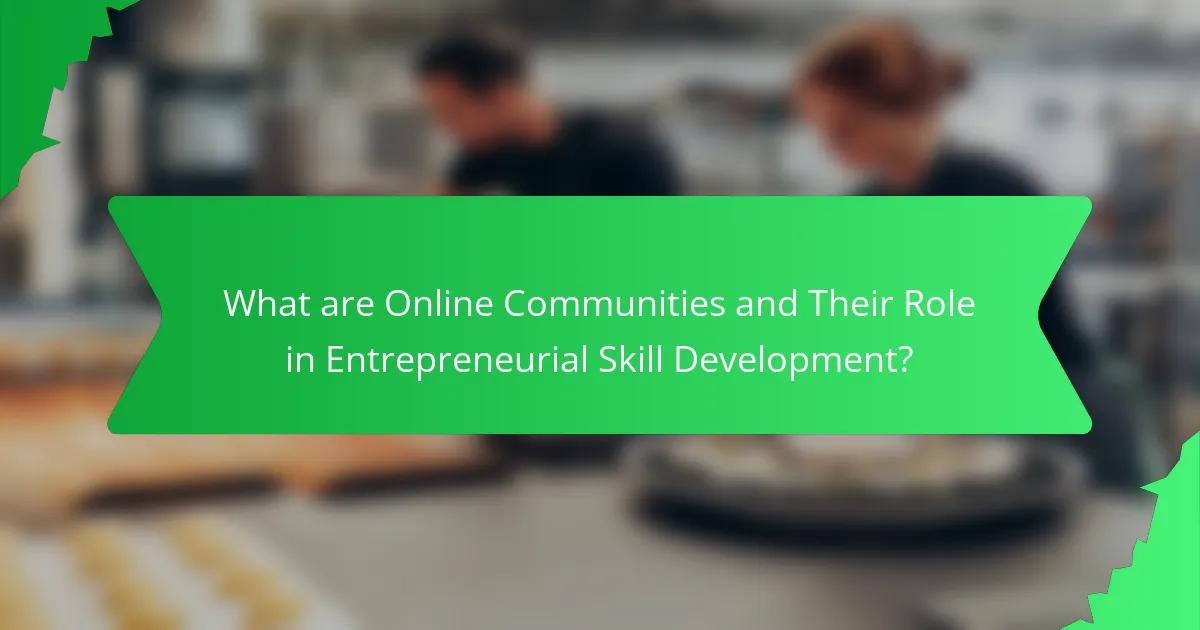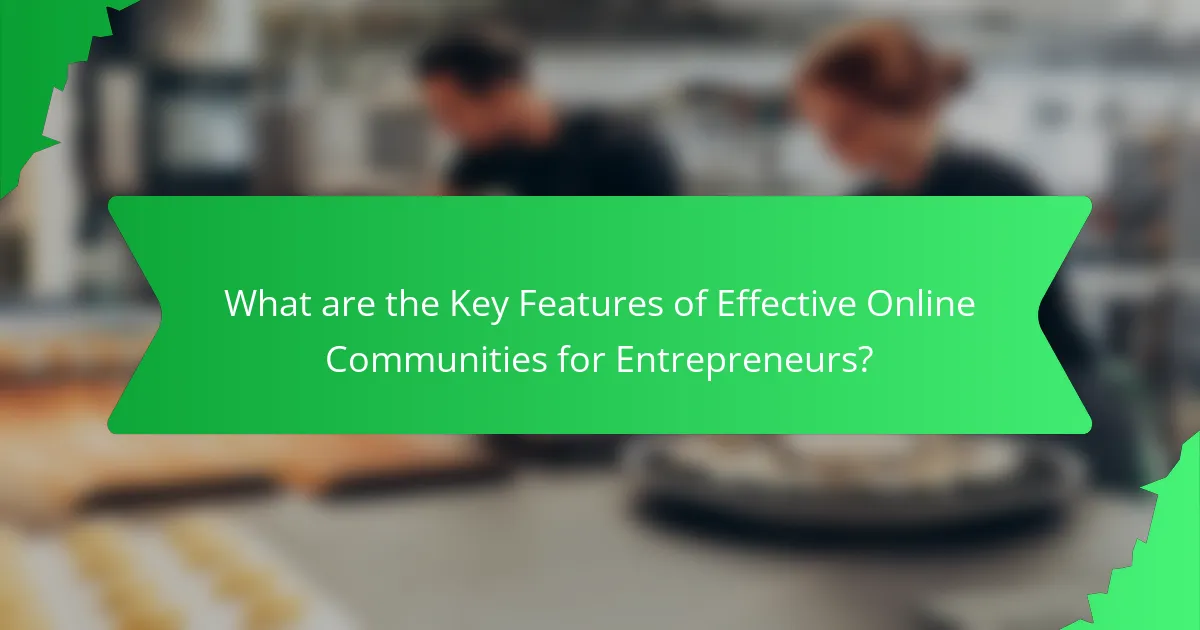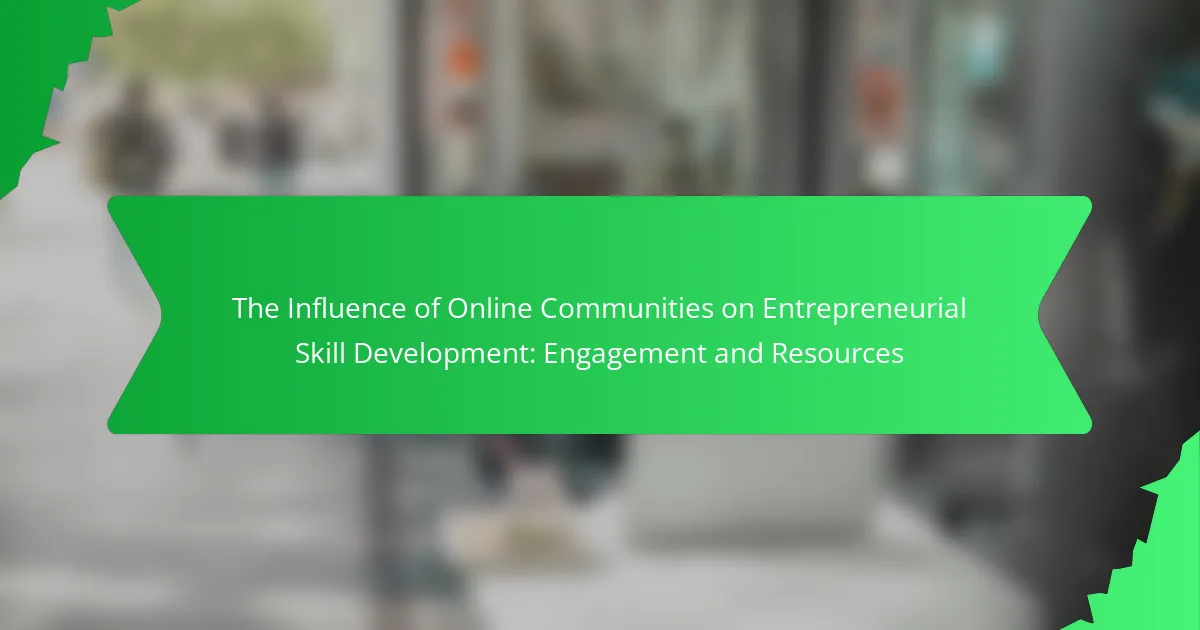Online communities are virtual spaces that facilitate interaction, knowledge sharing, and support among individuals, particularly entrepreneurs. These communities significantly contribute to entrepreneurial skill development by providing access to diverse resources, networking opportunities, and educational content such as workshops and webinars. Research indicates that active engagement in these communities correlates positively with skill acquisition and entrepreneurial success. However, entrepreneurs may face challenges, including information overload, lack of personal interaction, credibility issues, and time management concerns, which can impact their experience and effectiveness within these online environments. This article explores the influence of online communities on entrepreneurial skill development, emphasizing the importance of engagement and resource sharing.

What are Online Communities and Their Role in Entrepreneurial Skill Development?
Online communities are virtual spaces where individuals interact, share knowledge, and support each other. They play a significant role in entrepreneurial skill development by providing access to diverse resources. These communities facilitate networking opportunities, allowing entrepreneurs to connect with mentors and peers. Members can share experiences, which fosters learning and skill enhancement. Online communities often offer workshops, webinars, and discussions focused on entrepreneurship. Research indicates that entrepreneurs engaged in such communities report higher levels of skill acquisition. A study by the Harvard Business Review highlights the positive correlation between community engagement and entrepreneurial success.
How do online communities facilitate skill development for entrepreneurs?
Online communities facilitate skill development for entrepreneurs through networking, resource sharing, and mentorship opportunities. These platforms allow entrepreneurs to connect with peers and industry experts. Networking fosters collaboration and idea exchange. Resource sharing includes access to tools, articles, and tutorials. This information can enhance knowledge and practical skills. Mentorship opportunities provide guidance from experienced entrepreneurs. Research indicates that 70% of entrepreneurs attribute their growth to peer support in online communities. This collaborative environment accelerates learning and skill acquisition.
What types of skills can entrepreneurs develop through online communities?
Entrepreneurs can develop various skills through online communities. These skills include networking, collaboration, and communication. Networking skills are enhanced as entrepreneurs connect with peers and mentors. Collaboration skills improve through teamwork on projects and sharing resources. Communication skills are refined via discussions and feedback in community forums. Additionally, problem-solving skills are developed by addressing challenges collectively. Online communities also foster leadership skills as entrepreneurs take initiative in group settings. Finally, marketing skills can be cultivated through shared experiences and strategies. These skills are crucial for entrepreneurial success in today’s digital landscape.
How do interactions within these communities enhance learning?
Interactions within online communities enhance learning by facilitating knowledge sharing and collaboration. Members exchange insights, experiences, and resources, which broadens understanding. This collaborative environment encourages diverse perspectives, leading to richer discussions. Research shows that peer-to-peer interactions can improve problem-solving skills. Additionally, feedback from community members helps refine ideas and strategies. According to a study by Kuo and Belland (2016), social interaction in online learning environments positively impacts student engagement and learning outcomes. Thus, the dynamic exchange within these communities significantly contributes to entrepreneurial skill development.
Why are engagement and resources important in online communities?
Engagement and resources are crucial in online communities because they foster collaboration and knowledge sharing. High engagement levels encourage active participation, leading to richer discussions and diverse perspectives. Resources, such as tools and information, support members in skill development and problem-solving. Studies show that engaged communities can enhance learning outcomes by 30% compared to less active ones. Additionally, access to shared resources increases the likelihood of entrepreneurial success by providing essential support and guidance.
What role does active engagement play in skill acquisition?
Active engagement significantly enhances skill acquisition. It fosters deeper learning through hands-on practice and interaction. When individuals actively participate, they reinforce their understanding and retention of new concepts. Research shows that learners who engage actively retain information better than passive learners. For instance, a study by Prince (2004) indicates that active learning techniques can improve student performance by up to 50%. Furthermore, engagement in discussions and collaborative activities promotes critical thinking. This interaction also allows for immediate feedback, which is crucial for skill refinement. Overall, active engagement is a vital component in effectively acquiring new skills.
How do resources shared in online communities contribute to entrepreneurial growth?
Resources shared in online communities significantly contribute to entrepreneurial growth by providing access to valuable information and support. Entrepreneurs can gain insights into market trends, best practices, and innovative strategies through shared resources. These communities foster networking opportunities, allowing entrepreneurs to connect with mentors and peers. Collaboration within these groups can lead to partnerships and joint ventures that enhance business potential.
Studies show that entrepreneurs who engage in online communities report increased confidence and improved skills. For instance, a report by the Kauffman Foundation indicates that entrepreneurs who actively participate in such communities are 30% more likely to succeed in their ventures. Resources like webinars, articles, and forums facilitate knowledge exchange, which can lead to more informed decision-making.
Overall, the collective knowledge and support found in online communities create an environment conducive to entrepreneurial growth.

What are the Key Features of Effective Online Communities for Entrepreneurs?
Effective online communities for entrepreneurs feature strong engagement, resource sharing, and networking opportunities. Engagement is fostered through active discussions and interactive content. This keeps members involved and encourages knowledge exchange. Resource sharing includes access to tools, templates, and educational materials. Such resources enhance entrepreneurial skills and provide practical support. Networking opportunities allow entrepreneurs to connect with peers and mentors. This can lead to collaborations and partnerships. Additionally, a supportive environment promotes sharing experiences and advice. These features collectively contribute to the growth and success of entrepreneurs in the community.
What attributes make an online community beneficial for skill development?
An online community is beneficial for skill development due to several key attributes. First, access to diverse resources enhances learning opportunities. These resources can include tutorials, articles, and videos tailored to various skill levels. Second, active engagement fosters collaboration among members. This interaction allows for knowledge sharing and peer support. Third, mentorship opportunities within the community provide guidance from experienced individuals. Mentors can offer personalized advice and feedback. Fourth, a safe environment encourages experimentation and risk-taking. Members feel comfortable trying new skills without fear of judgment. Lastly, networking opportunities connect members with industry professionals. These connections can lead to job opportunities and partnerships, further enhancing skill development.
How does community size impact engagement and resource sharing?
Community size significantly impacts engagement and resource sharing. Larger communities often have more diverse members, leading to varied perspectives and increased interaction. In contrast, smaller communities may foster closer relationships but can limit the range of resources shared. Research indicates that engagement tends to be higher in medium-sized communities, where members feel connected yet benefit from a larger pool of resources. A study by Dunbar (1992) suggests that optimal community size for maintaining relationships is around 150 members. This balance supports both engagement and effective resource sharing.
What are the characteristics of a supportive community environment?
A supportive community environment is characterized by inclusivity, trust, and shared resources. Inclusivity ensures that all members feel welcomed and valued. Trust fosters open communication and collaboration among members. Shared resources provide access to knowledge, tools, and support. Active engagement encourages participation and contribution from all members. Positive reinforcement motivates individuals to pursue their goals. Networking opportunities enable connections that can lead to collaboration and growth. Lastly, a focus on shared goals aligns the community’s efforts towards collective success. These characteristics collectively enhance the entrepreneurial skill development of members within the community.
How do different platforms influence community engagement?
Different platforms influence community engagement by shaping interaction styles and accessibility. Social media platforms like Facebook encourage casual conversations and quick feedback. They allow for real-time interaction, fostering a sense of community. In contrast, platforms like LinkedIn facilitate professional networking and knowledge sharing. This leads to more formal discussions and resource exchange. Research shows that 70% of users engage more on platforms that provide visual content. Visuals enhance understanding and retention, increasing overall engagement. Additionally, platforms with user-generated content, such as Reddit, promote deeper discussions and community-building. This diversity in platform characteristics significantly affects how communities engage and grow.
What are the advantages of using social media for entrepreneurial skill development?
Social media offers several advantages for entrepreneurial skill development. It provides access to a vast network of resources and knowledge. Entrepreneurs can connect with industry experts and peers easily. This connectivity fosters collaboration and idea sharing. Social media platforms facilitate real-time feedback on business ideas. Entrepreneurs can engage in discussions that enhance their understanding of market trends. Additionally, social media serves as a platform for promoting personal branding. According to a study by the Harvard Business Review, 70% of entrepreneurs report that social media has positively impacted their business growth. This demonstrates the effectiveness of social media in enhancing entrepreneurial skills.
How do forums and specialized websites compare in fostering engagement?
Forums foster engagement through interactive discussions and real-time feedback. They allow users to post questions and receive answers from a community. This dynamic encourages participation and builds a sense of belonging. Specialized websites, on the other hand, often provide curated content and resources. They may facilitate engagement through articles, webinars, and structured learning paths.
However, forums typically offer more spontaneous interaction. Research by the Pew Research Center indicates that 23% of online adults engage in forums for advice and support. This high engagement rate shows the effectiveness of forums in building community connections. Specialized websites may have lower engagement rates but can attract users seeking specific information.
In summary, forums excel in real-time interactions while specialized websites focus on delivering targeted content. Both have unique strengths in fostering engagement within online communities.

What Challenges Do Entrepreneurs Face in Online Communities?
Entrepreneurs face several challenges in online communities. One major challenge is information overload. Entrepreneurs often encounter an overwhelming amount of content, making it difficult to discern useful information. Another challenge is the lack of personal interaction. Online communication can lead to misunderstandings and reduced relationship-building opportunities. Additionally, entrepreneurs may struggle with credibility issues. Misinformation can spread quickly in online spaces, impacting trust. Competition within these communities can also be intense. Entrepreneurs may find it hard to stand out among numerous peers. Finally, time management becomes crucial. Engaging in online communities requires significant time investment, which can detract from other business activities.
What barriers exist that hinder effective engagement in online communities?
Barriers that hinder effective engagement in online communities include lack of trust, poor communication, and accessibility issues. Lack of trust can prevent users from sharing ideas and collaborating. Poor communication often leads to misunderstandings and disengagement. Accessibility issues, such as technical difficulties or lack of internet access, can exclude potential participants. Additionally, cultural differences may create conflicts or misunderstandings among community members. A study by Goh et al. (2016) found that these barriers significantly impact user participation and satisfaction in online platforms.
How can misinformation affect skill development within these communities?
Misinformation can significantly hinder skill development within online entrepreneurial communities. It can lead to the adoption of ineffective strategies and practices. For example, false claims about successful business models may misguide members. This can result in wasted time and resources on unproven methods. Additionally, misinformation can create confusion about essential skills and tools. As a result, community members may overlook valuable learning opportunities. Research shows that misinformation can spread rapidly in digital spaces, amplifying its negative impact. Accurate information is crucial for effective skill acquisition and application in entrepreneurship.
What strategies can entrepreneurs use to overcome these challenges?
Entrepreneurs can use networking, mentorship, and leveraging online communities to overcome challenges. Networking allows entrepreneurs to connect with peers and industry experts. This interaction can provide insights and support. Mentorship offers guidance from experienced individuals. Mentors can share valuable experiences and advice. Online communities provide resources and a platform for collaboration. These communities often share best practices and solutions to common problems. Research indicates that entrepreneurs who engage with online communities report increased skill development. A study by the Kauffman Foundation found that peer support significantly enhances entrepreneurial success.
How can entrepreneurs maximize their learning from online communities?
Entrepreneurs can maximize their learning from online communities by actively engaging with members and sharing knowledge. Participation in discussions enhances understanding of diverse perspectives. Asking questions allows entrepreneurs to gain insights into specific challenges. Providing value through sharing experiences fosters reciprocal learning. Networking with experienced entrepreneurs can lead to mentorship opportunities. Utilizing resources shared within these communities can accelerate skill development. Research indicates that engaged community members report higher levels of entrepreneurial success. A study by the Kauffman Foundation found that entrepreneurs who participate in online forums are more likely to innovate and grow their businesses.
What best practices should entrepreneurs follow to engage effectively?
Entrepreneurs should actively participate in online communities to engage effectively. Regularly sharing insights fosters trust and credibility. Responding promptly to questions encourages interaction. Providing valuable resources enhances the community experience. Networking with other entrepreneurs can lead to collaborative opportunities. Utilizing feedback from the community helps refine business strategies. Consistent engagement increases visibility and brand recognition. Research shows that active participation in online forums can boost entrepreneurial success rates significantly.
How can entrepreneurs leverage resources for their specific needs?
Entrepreneurs can leverage resources by identifying their specific needs and accessing relevant online communities. These communities provide networking opportunities, mentorship, and shared knowledge. Entrepreneurs can engage with experienced peers for guidance on challenges. They can also utilize online platforms for collaborative projects and resource sharing. Research shows that 70% of entrepreneurs benefit from peer support in online forums. This engagement enhances skill development and resource acquisition. By actively participating, entrepreneurs can tailor resources to their unique business contexts.
What practical tips can enhance the experience in online communities for entrepreneurs?
Engaging actively in discussions enhances the experience in online communities for entrepreneurs. Regularly sharing insights and experiences fosters connections. Asking questions encourages interaction and knowledge sharing. Providing constructive feedback helps build a supportive environment. Networking with other members can lead to valuable partnerships. Utilizing community resources, such as webinars and workshops, boosts skill development. Setting specific goals for participation can keep engagement focused. Lastly, respecting diverse opinions promotes inclusivity and enriches the community experience.
The main entity of the article is online communities and their influence on entrepreneurial skill development. The article explores how these virtual spaces facilitate networking, resource sharing, and mentorship, significantly enhancing the skills of entrepreneurs. Key aspects discussed include the types of skills developed through community engagement, the importance of active participation and shared resources, and the characteristics of effective online communities. Additionally, challenges faced by entrepreneurs within these communities, such as misinformation and engagement barriers, are addressed along with strategies to overcome them for maximizing learning outcomes.
